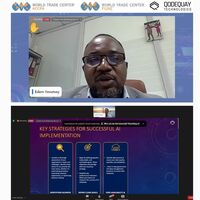

News

AI & Economic Growth: WTC Pune

World Trade Center Pune organized an online webinar for its counterpart, World Trade Center Accra, which was well attended by over three hundred spectators. A member of World Trade Center Pune, Qodequay, delivered a presentation offering a firsthand look at the significant impact of AI and ML on management strategies, highlighting their potential to create a more efficient and promising future. The event provided invaluable insights into the cutting-edge AI technologies reshaping industries worldwide.
In today's rapidly evolving business landscape, the integration of Artificial Intelligence (AI) and Machine Learning (ML) has emerged as a profound and transformative force. These technologies empower data- driven decision-making by enabling real-time analysis of vast datasets, providing invaluable insights that enable organizations to predict trends, optimize resources, and identify opportunities and risks with unprecedented precision. This ultimately leads to more informed and effective decision-making, paving the way for unprecedented success.
In the business world, personalized customer experiences are paramount. AI and ML empower businesses to cater to individual needs by analyzing customer data and predicting preferences. This fosters stronger customer relationships and brand loyalty, ensuring a loyal and satisfied customer base. Furthermore, in the realm of risk management, AI and ML play a crucial role in identifying potential threats and detecting anomalies in real-time, be it in cybersecurity, financial fraud, or supply chain disruptions, serving as essential tools for mitigating risks and ensuring seamless business continuity.
Qodequay presented two case studies which emphasized real-time scenarios related to AI and ML. In the first case study, a leading e-commerce company employed AI to optimize its inventory levels. By utilizing ML to analyze historical sales data and customer demand patterns, the company predicted future demand for its products and set optimal inventory levels, reducing inventory costs by ten percent and improving customer satisfaction ratings by five percent.
In the second case study, a multinational corporation leveraged AI to enhance the efficiency of its customer service operations. The company developed an AI-powered chatbot that could handle over eighty percent of customer inquiries without human intervention, reducing customer wait times and enabling service representatives to focus on more complex issues.
The webinar also shed light on the challenges faced by small and medium-sized enterprises (SMEs) in their pursuit of competitiveness and sustainability. AI technology offers a potent solution, enabling SMEs not only to survive but thrive in the fast-paced business world. With its various capabilities, AI streamlines data management, enhances customer engagement, optimizes resource allocation, improves marketing and sales, and promotes data-driven decision-making for SMEs.
The webinar also emphasized the pervasive influence of AI, impacting everything from social networking websites to personalized customer engagement and targeted advertising. It plays a pivotal role in machine learning, deep learning, and neural networks, with applications ranging from autonomous technology to image and voice recognition.
In the field of medical and drug discovery, AI's development is progressing rapidly, predicting molecular interactions and streamlining the creation of more effective and safer medications while reducing time and costs. In patient care and personalized treatment, AI creates tailored treatment plans, enhances diagnostics, optimizes healthcare operations and management, reduces costs, and improves patient care coordination.
Artificial intelligence (AI) is rapidly transforming the world, and its impact on economic development is poised to be profound, with the potential to increase productivity, create new industries, and enhance the quality of life for people worldwide. AI has increased productivity by automating tasks currently performed by humans, freeing workers to focus on more creative and strategic work, resulting in significant productivity gains across various industries. AI is also creating new industries and job opportunities that did not exist before.
According to a McKinsey Global Institute report, AI could boost global GDP by up to thirteen trillion dollars by 2030. This growth would be driven by a combination of factors, including increased productivity, new product and service development, and improved labor market matching. The report also suggests that AI could lead to a significant redistribution of economic benefits among countries and industries. The countries and industries that can adopt AI most quickly and effectively will benefit the most.
Recent developments indicate that AI has improved the quality of life. AI-powered medical diagnostics assist doctors in identifying diseases earlier and more accurately, leading to better patient outcomes. AI can also be used to develop new educational tools and enhance the efficiency of public services. Overall, the economic impact of AI is likely to be positive.